Power outages can disrupt everything, but diesel generators ensure a reliable backup when you need it most. Designed for efficiency and durability, these generators deliver consistent power for homes, businesses, and industrial sites. With fuel efficiency, extended runtimes, and robust construction, diesel-powered units outperform many alternatives in demanding conditions.
Unlike gasoline models, diesel generators require less maintenance and offer superior longevity, making them a preferred choice for heavy-duty applications. Whether you need a standby generator for emergencies or a portable unit for remote job sites, there’s a diesel generator suited for every need.
Investing in a diesel generator means uninterrupted power, lower operating costs, and dependable performance in critical situations. Choose the right model and stay prepared for any power challenge.
Our Top Diesel Generators Picks
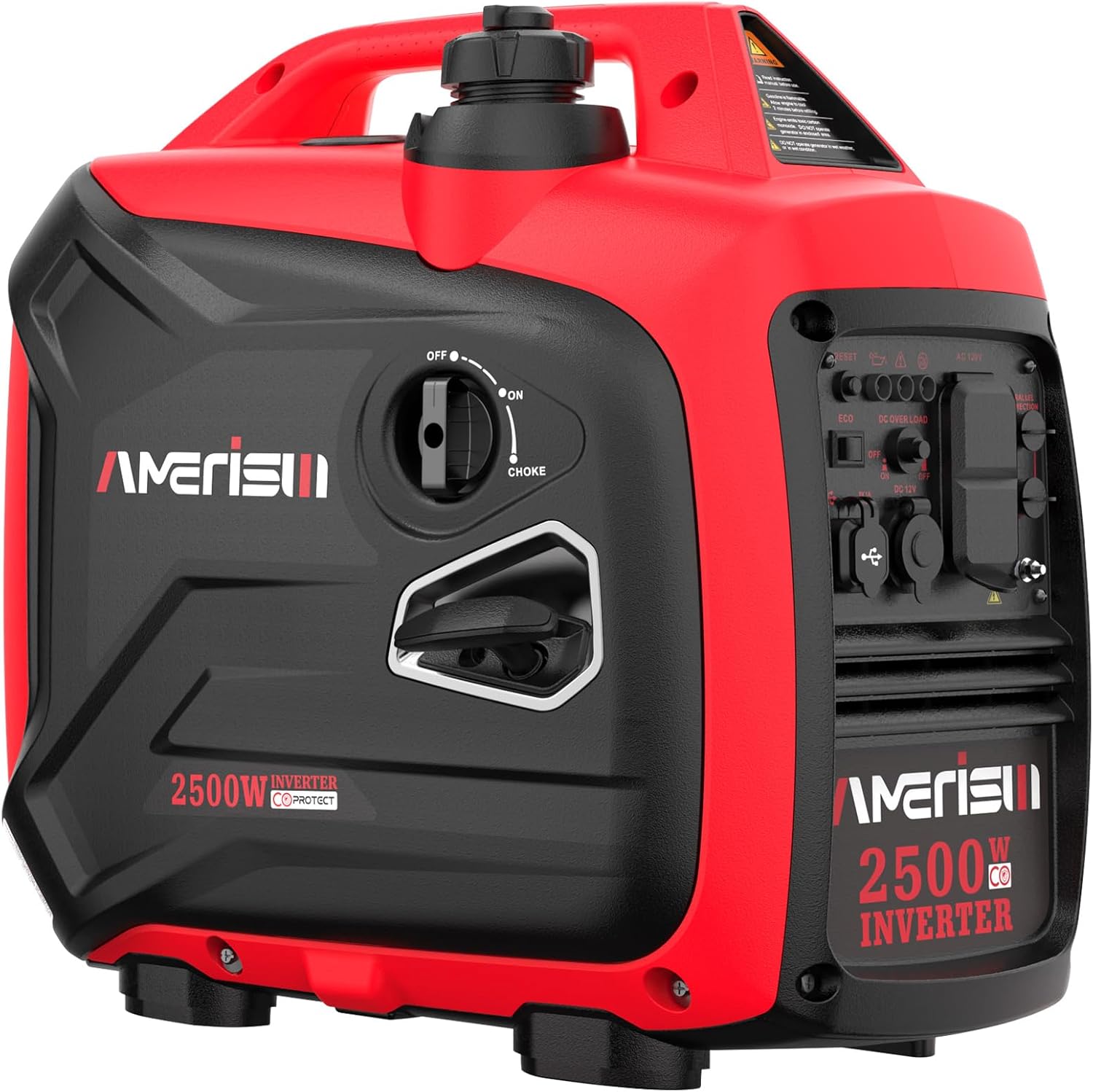
AMERISUN 2500-Watt Portable Inverter Generator
Check on AmazonKey Specs
- Wattage: 2500 surge watts, 1900 rated watts
- Noise Level: 64 dBA from 23 feet
- Fuel Tank: 1.06 gallons for up to 5.5 hours at 50% load
- Power Ports: (2) 120V AC outlets, (2) USB-A ports, (1) 12V DC port
- Safety Feature: CO Shutdown Sensor for automatic shutoff when carbon monoxide levels are too high
The AMERISUN 2500-Watt Portable Inverter Generator is perfect for camping or home backup with its 80cc engine generating 2500 surge watts and 1900 rated watts. It operates at a low noise level of 64 dBA and can run for up to 5.5 hours on a 1.06-gallon tank at 50% load. This lightweight generator (39.7 lbs) produces clean power and includes USB ports and safety features like the CO Shutdown Sensor for added protection.
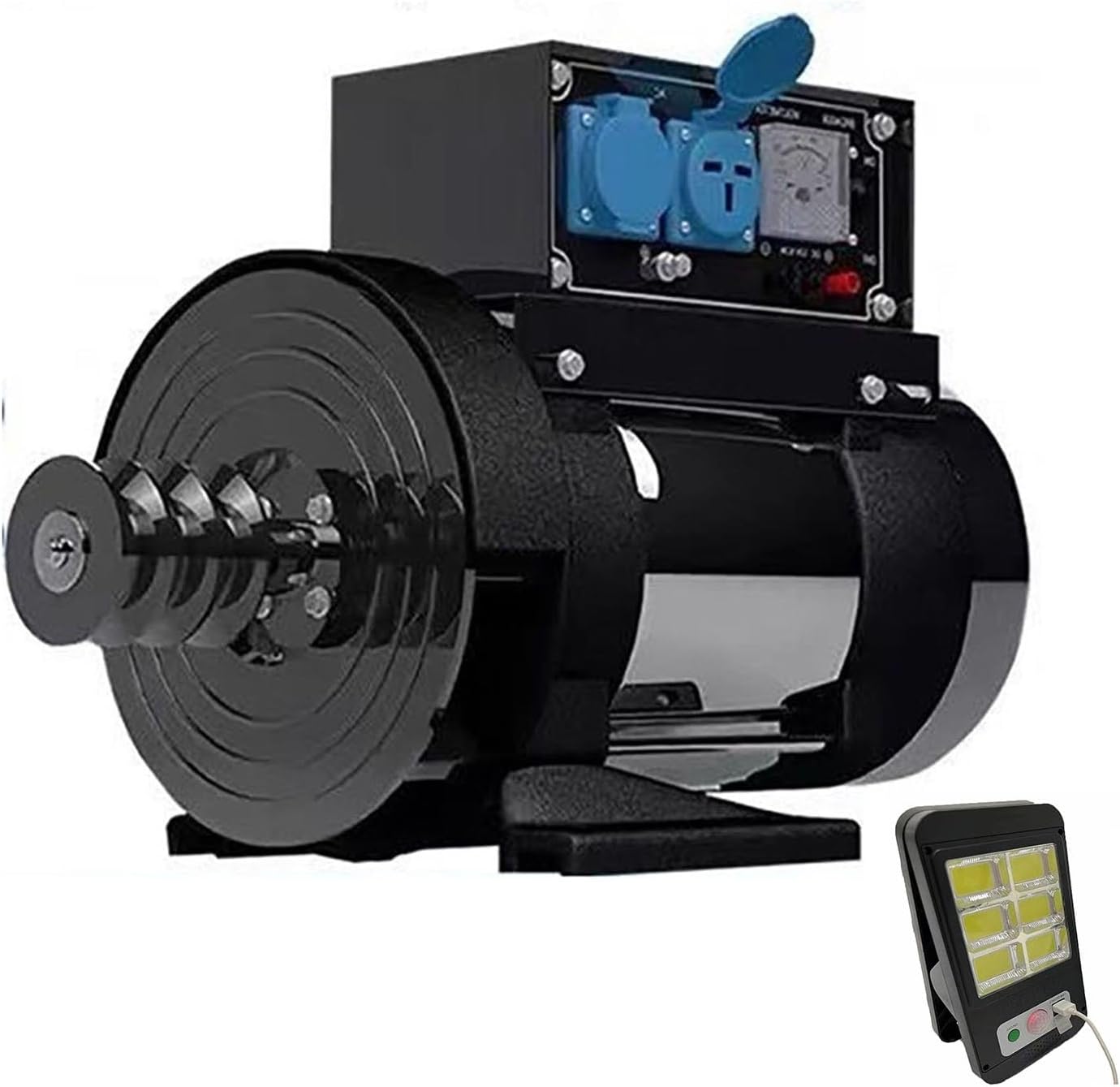
5KW/6KW/8KW/10KW Diesel Generator
Check on Amazon
Key Specs:
- Power Output: Available in 5KW, 6KW, 8KW, and 10KW options
- Voltage: 220V, 50Hz frequency, and 3000 RPM rated speed
- Voltage Regulation: Equipped with a voltage regulator for stable voltage output
- DC Charging: Includes a 12V DC feature for charging the battery if it runs out of power
- Wide Application: Suitable for powering lighting, TV, fan, refrigerator, washing machine, air conditioner, induction cooker, water pump, and electric welder
The 5KW/6KW/8KW/10KW Diesel Generator offers reliable power generation with features that make it versatile and efficient. It utilizes a single-phase/three-phase excitation synchronous alternator and pure copper coil, which enhances electrical conductivity and reduces resistance for better power output.
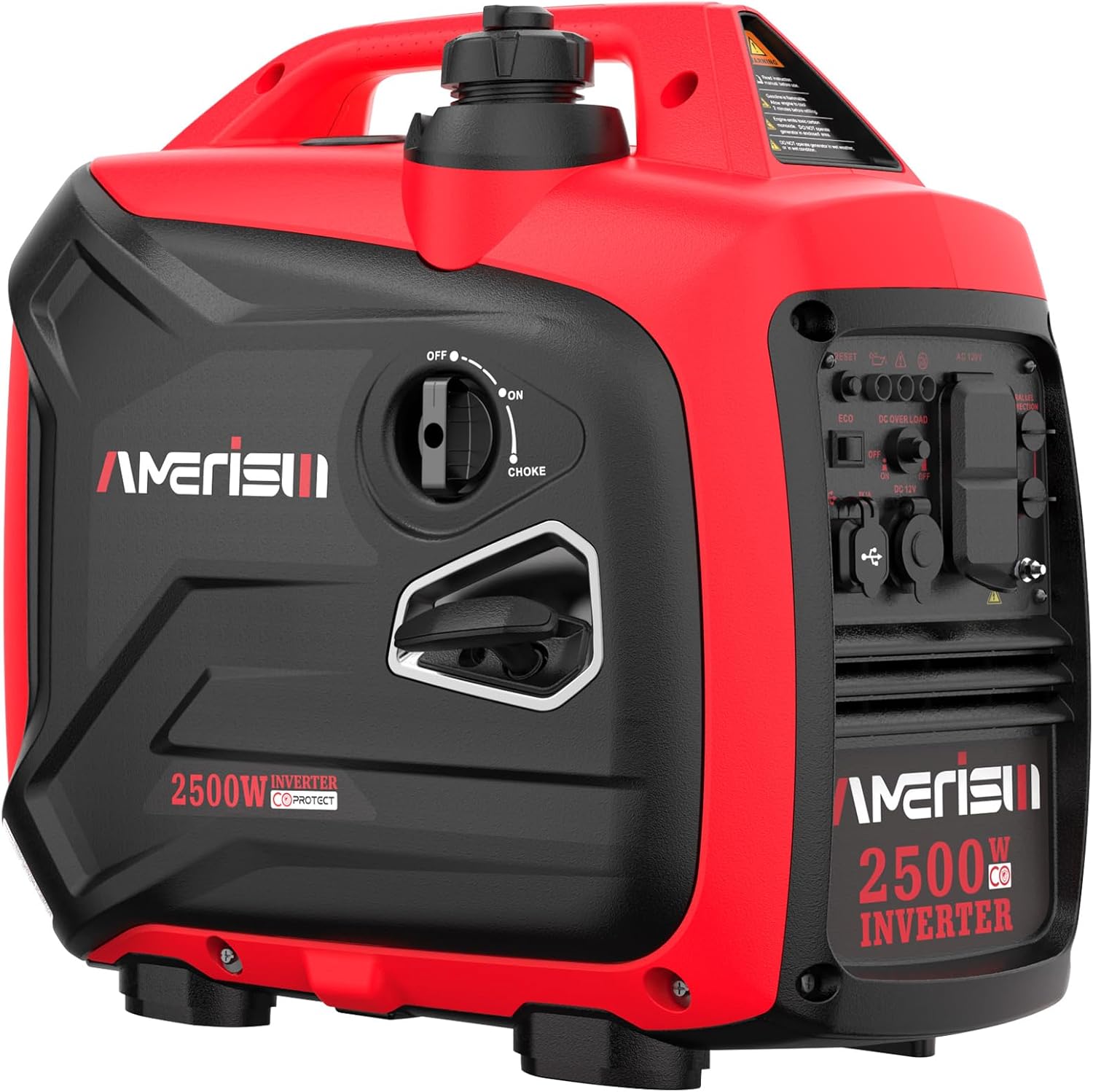
2500-Watt Portable Inverter Generator
Check on Amazon
Key Specs:
- Surge Wattage: 2500 watts
- Rated Wattage: 1900 watts
- Weight: 39.7 lbs
- Tank Capacity: 1.06 Gallons
- Special Features: CO Shutdown Sensor, USB Ports, Low Oil Shutdown
The AMERISUN 2500-Watt Portable Inverter Generator is a lightweight and reliable power solution ideal for camping and home backup. With an 80cc engine, it delivers up to 2500 surge watts and 1900 rated watts of clean power, ensuring safe operation for sensitive electronics like smartphones and laptops. At just 39.7 lbs, it’s easy to transport, and its super quiet operation (64 dBA) makes it perfect for outdoor use. The CO Shutdown Sensor adds an extra layer of safety by automatically turning off the generator if dangerous carbon monoxide levels are detected.
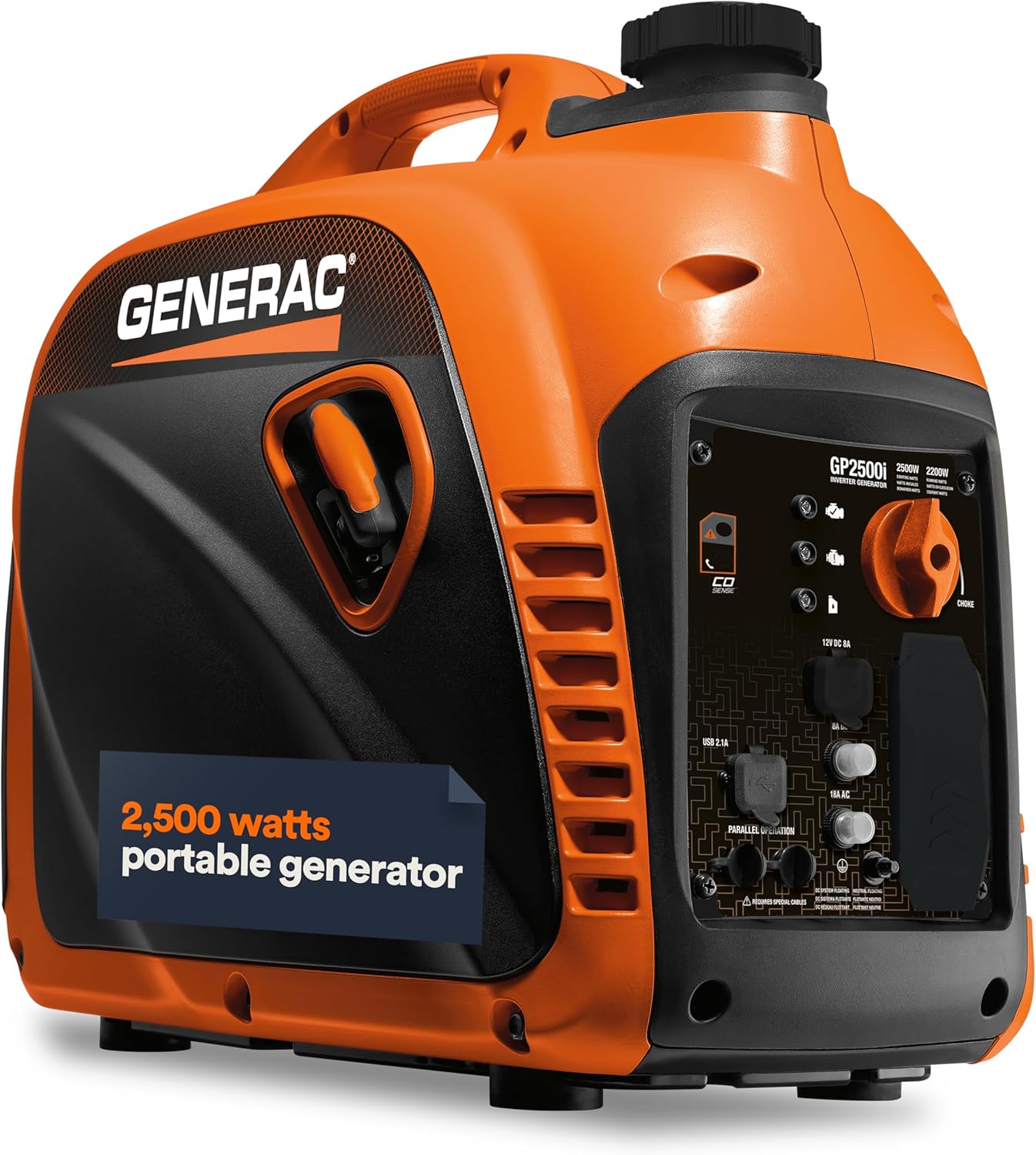
Generac 2,500-Watt Gas Powered Portable Inverter Generator
Check on Amazon
Key Specs:
- Surge Wattage: 2500 watts
- Rated Wattage: 2200 watts
- Weight: 48 lbs
- Fuel Efficiency: Economy Mode for reduced fuel consumption
- Special Features: COsense Technology, Parallel Capability, USB Port
The Generac 2,500-Watt Gas Powered Portable Inverter Generator is an excellent solution for outdoor power needs. With TruePower Technology, it provides clean and stable power, making it safe for sensitive electronics. The generator is highly portable, weighing just 48 pounds and featuring a built-in handle for easy transport. Its super quiet operation and Economy Mode for fuel efficiency ensure you can run it for extended periods without disturbing the peace. Equipped with COsense Technology and parallel capability, this generator offers enhanced safety and power versatility.
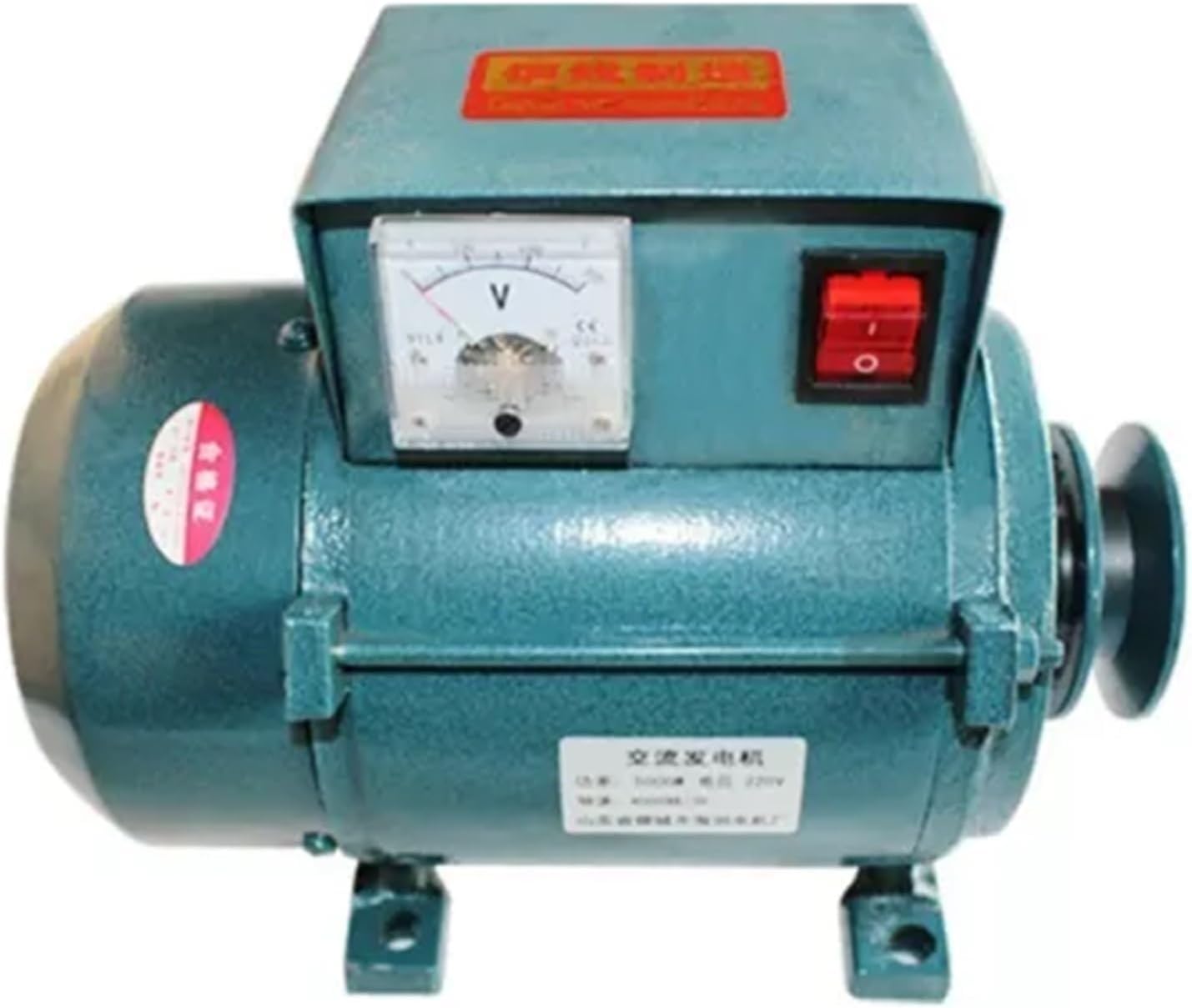
7000W 220V Small Generator
Check on AmazonKey Specs:
- Surge Wattage: 7000W
- Rated Wattage: 4000W
- Engine Speed: Up to 4000 rpm
- Noise Control: Low engine noise for quieter operation
- Design: Belt-driven, simple and reliable
The 7000W 220V Small Generator offers a reliable and efficient solution for various applications. With a small engine running at up to 4000 rpm, it delivers excellent power while maintaining low noise levels for a quieter operation. Its belt-driven design ensures a simple and durable structure that is easy to maintain and repair, making it ideal for long-term use. Whether for household tasks or light industrial applications, this generator is versatile enough to drive lawn mowers, water pumps, and more.
Diesel generators have been a reliable source of power for many years. They are used in a variety of settings, from providing backup power for hospitals and data centers to powering construction sites and remote locations. Diesel generators are known for their durability, efficiency, and ability to provide a large amount of power.
The basic principle of a diesel generator is simple: it converts the chemical energy stored in diesel fuel into mechanical energy, which is then used to generate electricity. This is achieved through a process known as internal combustion, where the fuel is ignited inside the engine, causing it to expand and drive a piston. This mechanical force is then converted into electrical energy by an alternator.
Despite their widespread use, many people are unfamiliar with the specifics of how diesel generators work and what to consider when purchasing one. This article aims to provide a comprehensive overview of diesel generators, from their basic operation to factors to consider when buying, and their environmental impact.
Understanding the Basics of Diesel Generators
At its core, a diesel generator is a combination of a diesel engine with an electric generator (often an alternator) to generate electrical energy. This is a specific case of engine-generator. A diesel compression-ignition engine often is designed to run on fuel oil, but some types are adapted for other liquid fuels or natural gas.
The main components of a diesel generator are the engine, the alternator, and the control system. The engine is the heart of the generator and provides the mechanical energy needed to generate electricity. The alternator, on the other hand, is responsible for converting this mechanical energy into electrical energy. The control system regulates the operation of the generator, ensuring that it produces the right amount of power and shuts down safely in case of a problem.
One of the key advantages of diesel generators is their fuel efficiency. Diesel engines are more efficient than gasoline engines, which means they use less fuel to produce the same amount of power. This makes diesel generators a cost-effective choice for large-scale power generation.
The Importance of Diesel Generators in Power Backup
Diesel generators play a crucial role in power backup systems. In many industries, a power outage can lead to significant financial losses, not to mention potential safety risks. For instance, in hospitals, power is needed to run life-saving equipment, while in data centers, power is essential to keep servers running and prevent data loss.
In these and many other scenarios, diesel generators provide a reliable source of backup power. When the main power supply fails, the control system of the diesel generator detects the power outage and starts the generator. Once the main power supply is restored, the control system automatically switches off the generator.
Moreover, diesel generators are not only used for emergency power backup. They are also used in places where there is no access to the power grid, such as construction sites, mining operations, and remote communities. In these cases, diesel generators are the main source of power.
Factors to Consider Before Buying a Diesel Generator
When buying a diesel generator, there are several factors to consider. The first is the power requirement. This is determined by the total wattage of all the devices that will be powered by the generator. It’s important to choose a generator that can provide the required power, with some margin for safety.
The second factor is the type of generator. There are two main types: standby generators, which are installed permanently and provide backup power in case of a power outage, and portable generators, which can be moved from place to place. The choice between the two depends on the intended use of the generator.
The third factor is the fuel efficiency of the generator. As mentioned earlier, diesel generators are more fuel-efficient than gasoline generators. However, there can be significant differences in fuel efficiency between different models of diesel generators. Therefore, it’s important to compare the fuel efficiency of different models before making a purchase.
The Role of Power Output in Choosing a Diesel Generator
The power output of a diesel generator is one of the most important factors to consider when making a purchase. The power output, measured in kilowatts (kW), determines how many appliances or systems the generator can power at once. For instance, a small generator may only be able to power a few lights and a refrigerator, while a large generator could power an entire house or a small business.
When calculating the power output needed, it’s important to consider both the running wattage and the starting wattage of the appliances or systems that will be powered by the generator. The starting wattage, which is typically higher than the running wattage, is the amount of power needed to start an appliance or system. If the generator’s power output is too low, it may not be able to start all the appliances or systems at once.
Moreover, it’s a good idea to choose a generator with a power output that is slightly higher than the calculated requirement. This provides a margin of safety and allows for future expansion.
Understanding the Different Types of Diesel Generators
There are several types of diesel generators, each with its own advantages and disadvantages. The most common types are standby generators, portable generators, and industrial generators.
Standby generators are designed to provide backup power in case of a power outage. They are typically large, powerful, and permanently installed. Standby generators are commonly used in hospitals, data centers, and other places where a power outage could have serious consequences.
Portable generators, as the name suggests, are designed to be moved from place to place. They are typically smaller and less powerful than standby generators, but they are also more flexible. Portable generators are commonly used in construction, camping, and other situations where temporary power is needed.
Industrial generators are designed for heavy-duty use in industries such as construction, mining, and manufacturing. They are typically very large and powerful, and they are designed to run for long periods of time.
The Impact of Generator Size and Portability
The size and portability of a diesel generator are important factors to consider when making a purchase. The size of the generator is directly related to its power output: larger generators typically have a higher power output than smaller ones. However, larger generators are also heavier and more difficult to move, which can be a disadvantage in some situations.
Portability is a key factor for those who need a generator that can be moved from place to place. Portable generators are typically smaller and lighter than standby generators, and they often come with wheels or handles for easy transportation. However, portable generators typically have a lower power output than standby generators.
When choosing a generator, it’s important to balance the need for power output with the need for portability. For instance, a construction company might choose a large, powerful generator that can be transported on a trailer, while a homeowner might choose a smaller, more portable generator for occasional use.
Fuel Efficiency and Consumption of Diesel Generators
Fuel efficiency is a key factor to consider when buying a diesel generator. More fuel-efficient generators can run for longer on a given amount of fuel, which can save money in the long run. Fuel efficiency is typically measured in terms of the amount of fuel consumed per hour for a given power output.
However, fuel efficiency is not the only factor to consider when it comes to fuel consumption. The size of the fuel tank also plays a role. A generator with a large fuel tank can run for longer without needing to be refueled, which can be a major advantage in situations where fuel is scarce or difficult to obtain.
Moreover, it’s important to remember that diesel generators need to be run regularly to keep them in good working order. This means that even a very fuel-efficient generator can consume a significant amount of fuel over time.
Noise Level Considerations when Buying a Diesel Generator
Noise level is an important consideration when buying a diesel generator. Generators can be quite loud, and this can be a problem in residential areas or other places where noise is a concern. The noise level of a generator is typically measured in decibels (dB), and most manufacturers provide this information in the product specifications.
There are several ways to reduce the noise level of a diesel generator. One is to choose a generator with a sound-dampening enclosure, which can significantly reduce noise. Another is to install the generator as far away as possible from living areas or places where people work or gather.
It’s also worth noting that larger generators are typically louder than smaller ones, and generators that run at higher speeds are typically louder than those that run at lower speeds. Therefore, it’s important to consider the noise level along with the power output and other factors when choosing a generator.
The Importance of Generator Brand and Manufacturer Reputation
The brand and manufacturer reputation are important factors to consider when buying a diesel generator. A well-known brand or manufacturer is more likely to produce a high-quality product and provide good customer service. Moreover, well-known brands and manufacturers typically have a wide network of service centers, which can make maintenance and repairs more convenient.
When evaluating the reputation of a brand or manufacturer, it’s a good idea to look at customer reviews and ratings. These can provide valuable insights into the quality and reliability of the generator, as well as the quality of the customer service. It’s also a good idea to look at the warranty and after-sales service offered by the manufacturer.
However, it’s important to remember that a well-known brand or manufacturer is not a guarantee of quality. There are many lesser-known brands and manufacturers that produce high-quality diesel generators. Therefore, it’s important to do thorough research and consider all the factors before making a purchase.
Maintenance and Servicing of Diesel Generators
Maintenance and servicing are crucial for the longevity and performance of a diesel generator. Regular maintenance can prevent breakdowns, increase fuel efficiency, and extend the life of the generator. Common maintenance tasks include changing the oil, replacing the air and fuel filters, and checking the coolant level.
Most manufacturers provide a maintenance schedule for their generators, which outlines the recommended maintenance tasks and their frequency. It’s important to follow this schedule as closely as possible. In addition to regular maintenance, it’s also a good idea to have the generator serviced by a professional at least once a year.
Moreover, it’s important to keep a record of all maintenance and servicing activities. This can be useful for troubleshooting, as well as for warranty claims. It’s also a good idea to keep a stock of spare parts, such as oil, filters, and belts, especially in remote locations where these items may be difficult to obtain.
Safety Features to Look for in a Diesel Generator
Safety is a crucial consideration when buying a diesel generator. A good generator should have a range of safety features to protect the user and the generator itself. One of the most important safety features is an automatic shutdown system, which shuts down the generator in case of a problem, such as low oil pressure, high temperature, or overloading.
Another important safety feature is a circuit breaker, which protects the generator and the devices it’s powering from electrical faults. Some generators also have a ground-fault circuit interrupter (GFCI), which protects against electric shock.
Other safety features to look for include a sturdy enclosure, which protects the generator from damage and reduces noise, and a fuel gauge, which allows the user to monitor the fuel level. It’s also a good idea to choose a generator with a low-oil shutdown feature, which shuts down the generator when the oil level is too low.
The Role of Warranty and After-Sales Service in Generator Purchase
The warranty and after-sales service are important factors to consider when buying a diesel generator. A good warranty can provide peace of mind and protect against unexpected costs. Most manufacturers offer a warranty that covers defects in materials and workmanship for a certain period of time after the purchase.
However, the length and terms of the warranty can vary significantly between different manufacturers. Therefore, it’s important to read the warranty carefully and understand what it covers and what it doesn’t. It’s also a good idea to check whether the warranty is transferable, in case you decide to sell the generator in the future.
After-sales service is another important factor to consider. Good after-sales service can make maintenance and repairs more convenient and less stressful. When evaluating the after-sales service, consider factors such as the availability of spare parts, the network of service centers, and the responsiveness of the customer service.
Environmental Impact of Diesel Generators
Diesel generators have a significant environmental impact. They emit greenhouse gases, such as carbon dioxide and methane, which contribute to climate change. They also emit pollutants, such as nitrogen oxides and particulate matter, which can harm human health and the environment.
However, the environmental impact of a diesel generator can be reduced in several ways. One is to choose a generator with a high fuel efficiency, which reduces the amount of fuel consumed and the emissions produced. Another is to maintain the generator properly, which can improve its efficiency and reduce emissions.
It’s also worth considering the use of renewable fuels, such as biodiesel, which can reduce the carbon footprint of the generator. However, not all generators are compatible with renewable fuels, so it’s important to check this before making a purchase.
Cost Considerations: Initial Purchase and Operational Costs
The cost of a diesel generator is a key factor to consider when making a purchase. The cost includes the initial purchase price, the operational costs, and the maintenance costs. The initial purchase price of a diesel generator can vary significantly, depending on the power output, the brand, and the features.
The operational costs include the cost of fuel, which can be significant, especially for large generators or generators that are used frequently. The maintenance costs include the cost of regular maintenance tasks, such as changing the oil and filters, as well as the cost of repairs.
When calculating the total cost of ownership, it’s important to consider all these factors. A cheap generator may seem like a good deal, but if it’s inefficient or unreliable, it could end up costing more in the long run.
Conclusion: Making an Informed Decision on Diesel Generators
Diesel generators are a reliable and versatile source of power. They can provide backup power in case of a power outage, power for remote locations, and power for large-scale industrial operations. However, choosing a diesel generator is a significant investment, and it’s important to make an informed decision.
When choosing a diesel generator, consider factors such as the power output, the fuel efficiency, the noise level, the size and portability, and the brand and manufacturer reputation. It’s also important to consider the maintenance and servicing requirements, the safety features, the warranty and after-sales service, and the environmental impact.
By considering all these factors, you can choose a diesel generator that meets your needs and provides reliable, efficient power for years to come.
FAQs
What is a diesel generator?
A: A diesel generator is a device that converts the chemical energy stored in diesel fuel into electrical energy. It consists of a diesel engine, which provides the mechanical energy, and an alternator, which converts this mechanical energy into electrical energy.
How does a diesel generator work?
A: A diesel generator works by using the energy from the combustion of diesel fuel to drive a piston. This mechanical force is then converted into electrical energy by an alternator.
What are the advantages of a diesel generator?
A: Diesel generators are known for their durability, efficiency, and ability to provide a large amount of power. They are also more fuel-efficient than gasoline generators, which makes them a cost-effective choice for large-scale power generation.
What factors should I consider when buying a diesel generator?
A: When buying a diesel generator, consider factors such as the power output, the fuel efficiency, the noise level, the size and portability, and the brand and manufacturer reputation. It’s also important to consider the maintenance and servicing requirements, the safety features, the warranty and after-sales service, and the environmental impact.
How can I reduce the environmental impact of a diesel generator?
A: The environmental impact of a diesel generator can be reduced by choosing a generator with a high fuel efficiency, maintaining the generator properly, and using renewable fuels, such as biodiesel, if possible.
